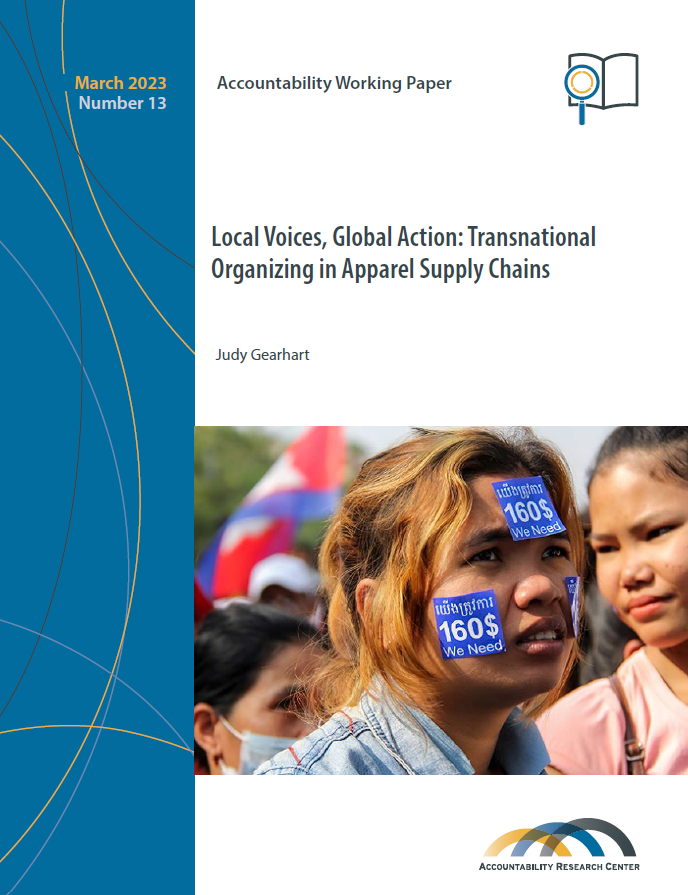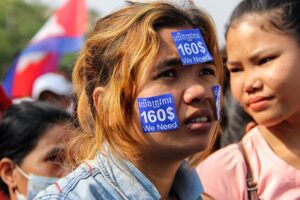
Local Voices, Global Action: Transnational Organizing in Apparel Supply Chains
Date: March 2023
Author(s): Judy Gearhart
Publication type: Accountability Working Paper
Published by: Accountability Research Center
This working paper discusses transnational organizing in apparel supply chains. It learns from labor rights advocates in the global South who are building social movements, advocating for national reforms, and promoting new forms of accountability in the apparel industry.
In particular, the paper examines how the Bangladesh Center for Worker Solidarity (BCWS) and Cambodia’s Center for Alliance of Labor and Human Rights (CENTRAL) have each played a critical role in advancing new agreements and monitoring their implementation. They have increasingly influenced and become leaders in the Clean Clothes Campaign Network.
Based on multiple interviews with CENTRAL’s Tola Moeun and BCWS’s Kalpona Akter, the paper traces how they have worked with international allies to expose flaws in supply chain monitoring in the apparel industry. It discusses how they worked with independent trade unions to build grassroots campaigns that often preceded or inspired international campaigns.
At the same time as Moeun and Akter came under threat for their national advocacy, they engaged international allies and became experts on trade policy and global supply chains. They are now not only leading proponents of enforceable, multiparty agreements between multinational corporations (MNCs) and independent trade unions, but also advocates for more effective mandatory human rights due diligence laws (MHRDD). Balancing this international advocacy with organizing for national policy reforms is a strategy made all the more necessary by the context of shrinking civic space in Bangladesh and Cambodia.
Many companies are seeking to strengthen their human rights due diligence in supplier countries and to engage stakeholders in that process. At this time, the perspectives and experience of BCWS and CENTRAL help identify what is needed to advance more worker-centered approaches.
Three sets of lessons emerge about what is needed to sustain transnational supply chain advocacy movements. Firstly, movement-building and trust are vital ingredients in effective supply chain advocacy. Secondly, it is important for human rights due diligence processes to take into account risks to worker rights. Thirdly, strengthening worker voice in global supply chains requires more effective scrutiny and regulation of MNCs.

This garment worker, pictured at a rally in front of the Ministry of Labor in Phnom Penh on 28 December 2013, is one of thousands who marched to demand a monthly living wage of $160. After the government announced a monthly wage of only $100, protests continued, and on 3 January 2014 military police opened fire. Four protesters were killed and dozens injured (Photo: Cambodian League for the Protection and Defense of Human Rights).
Judy Gearhart has advocated for workers’ rights in the apparel industry as an organizer in Mexico, a policy analyst, and an international campaigner. She currently serves as a senior researcher developing ARC’s programs on corporate accountability and workers’ rights. In 2021, she piloted a podcast series, The Labor Link, which features some of the interviews used in this paper. Gearhart has also been an adjunct professor at Columbia University since 2001, co-teaching the class Human Rights and the Politics of Inequality. Previously, she served as the executive director at the International Labor Rights Forum and as the program director at Social Accountability International. She also worked in Mexico and Honduras for national NGOs, UNICEF, and the ILO. Her writing, public speaking, and advocacy work has been cited or appeared in major news outlets, including CNN, NPR, the New York Times, and the Washington Post, and has covered a range of human rights and economic justice issues, including women’s rights, trade policy, labor rights, and democratic participation.
